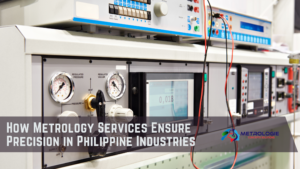Metrology serves as a cornerstone for Philippine manufacturers, offering indispensable tools and practices to ensure product quality, efficiency, and compliance with international standards. In this comprehensive guide, we delve into the significance of metrology, its implementation in manufacturing processes, and the best practices tailored for Philippine manufacturers.
Introduction
Metrology, the science of measurement, holds profound importance for Philippine manufacturers striving for excellence in their products and processes. It encompasses precise measurement techniques and standards crucial for maintaining quality, reliability, and competitiveness in today’s dynamic market landscape.
Introduction to Metrology
Metrology involves the study of measurement methods and standards and their application in various fields, including manufacturing. In the context of Philippine manufacturers, metrology holds significant importance as it directly impacts product quality, safety, and compliance with international standards.
Importance of Metrology for Philippine Manufacturers
Metrology forms the backbone of manufacturing operations, influencing product quality, compliance, and customer satisfaction. In an increasingly globalized market, adherence to metrology standards not only enhances product acceptance but also fosters trust among international partners and consumers.
Definition of Metrology
At its core, metrology entails the science of measurement, encompassing both theoretical and practical aspects essential for accurate quantification across various domains, including length, mass, temperature, and more.
Significance of Metrology in Manufacturing
In manufacturing, metrology plays a pivotal role in ensuring dimensional accuracy, consistency, and conformity to specifications throughout the production lifecycle. By facilitating precise measurements and evaluations, metrology mitigates errors, reduces waste, and enhances overall operational efficiency.
Overview of Metrology Standards in the Philippines
The Philippines adheres to rigorous metrology standards established by regulatory bodies such as the Philippine National Standards (PNS), aligning with international frameworks to uphold quality, safety, and interoperability across industries.
To overcome these challenges, Philippine manufacturers should focus on key metrology practices such as calibration and traceability, measurement uncertainty analysis, and proper documentation and record-keeping.
Understanding Metrology
A fundamental grasp of metrology principles and practices is imperative for manufacturers seeking to optimize their processes and outputs.
Challenges in Metrology for Philippine Manufacturers
Despite its importance, Philippine manufacturers face several challenges in implementing effective metrology practices. These challenges include the lack of standardized practices, limited access to advanced metrology equipment, and issues related to regulatory compliance.
Key Metrology Practices
To overcome these challenges, Philippine manufacturers should focus on key metrology practices such as calibration and traceability, measurement uncertainty analysis, and proper documentation and record-keeping.
Basics of Metrology
Metrology encompasses diverse disciplines, including dimensional metrology, mechanical metrology, and more, each tailored to specific measurement requirements and applications within the manufacturing realm.
Types of Metrology Instruments
Manufacturers leverage a myriad of metrology instruments ranging from vernier calipers and micrometers to coordinate measuring machines (CMMs) and optical comparators, each offering unique capabilities for precise measurement and analysis.
Importance of Accuracy in Metrology
Accuracy lies at the heart of metrology, underpinning the reliability and validity of measurement results. Manufacturers must prioritize calibration, validation, and traceability to uphold accuracy standards and ensure consistency in their processes.
Metrology Practices in Manufacturing
Efficient integration of metrology within manufacturing workflows is paramount for optimizing product quality and operational performance.
Implementation of Metrology in Manufacturing Processes
From incoming inspection to final assembly, manufacturers integrate metrology at various stages of the production cycle to verify part dimensions, assess geometric tolerances, and validate product conformity, thereby minimizing defects and rework.
Role of Metrology in Quality Control
Metrology serves as a cornerstone of quality control, enabling manufacturers to monitor process variations, detect deviations, and institute corrective measures to maintain product consistency and meet customer expectations.
Integration of Metrology with Industry 4.0
In the era of Industry 4.0, metrology converges with advanced technologies such as automation, robotics, and data analytics to enable real-time monitoring, predictive maintenance, and adaptive control, thereby revolutionizing manufacturing paradigms.
Challenges in Metrology for Philippine Manufacturers
Despite its transformative potential, metrology poses several challenges for Philippine manufacturers, necessitating concerted efforts to overcome barriers and foster a culture of excellence.
Lack of Awareness and Education
Many manufacturers face a lack of awareness regarding metrology principles and practices, hindering the adoption of advanced measurement techniques and impeding progress towards quality excellence.
Access to Advanced Metrology Equipment
Limited access to state-of-the-art metrology equipment and infrastructure poses a significant challenge for Philippine manufacturers, restricting their ability to leverage cutting-edge technologies for precision measurement and analysis.
Metrology Equipment Selection
Selecting the right metrology equipment is crucial for ensuring accurate measurements. Factors such as accuracy, precision, and budget should be considered when choosing equipment options suitable for Philippine manufacturers.
Training and Skill Development
In addition to investing in equipment, Philippine manufacturers should prioritize training and skill development for their personnel. Skilled metrologists play a vital role in ensuring the accuracy and reliability of measurements.
Quality Control Integration
Integrating metrology with quality control processes is essential for maintaining product quality and consistency. By aligning metrology practices with quality control standards, Philippine manufacturers can identify and address deviations early in the production process.
Metrology Standards and Regulations
Compliance with metrology standards and regulations is essential for Philippine manufacturers to operate legally and meet customer requirements. Familiarity with relevant standards and adherence to regulatory guidelines are critical aspects of effective metrology practices.
Cost-Effective Metrology Solutions
While investing in metrology equipment and training can be costly, there are cost-effective solutions available for Philippine manufacturers. By optimizing existing resources and exploring budget-friendly alternatives, manufacturers can implement effective metrology practices without overspending.
Compliance with International Standards
Achieving compliance with international metrology standards entails substantial investments in infrastructure, training, and certification, presenting financial and logistical hurdles for manufacturers operating within resource-constrained environments.
Best Practices for Metrology in Philippine Manufacturing
In navigating the complexities of metrology, Philippine manufacturers can adopt proactive strategies to optimize their measurement processes and enhance overall competitiveness.
Continuous Improvement Strategies
Continuous improvement is key to maintaining competitiveness in the manufacturing industry. By regularly evaluating and optimizing metrology practices, Philippine manufacturers can enhance efficiency, reduce costs, and improve overall quality.
Investment in Training and Education
Empowering personnel with comprehensive metrology training and education fosters a culture of proficiency and continuous improvement, enabling manufacturers to harness the full potential of metrology technologies and methodologies.
Collaboration with Metrology Experts
Engaging with metrology experts and service providers facilitates access to specialized knowledge, best practices, and cutting-edge solutions tailored to the unique needs and challenges of Philippine manufacturers.
Regular Calibration and Maintenance
Routine calibration and maintenance of metrology equipment are essential for preserving accuracy, reliability, and traceability, thereby minimizing measurement uncertainties and ensuring compliance with regulatory requirements.
Benefits of Effective Metrology
Implementing effective metrology practices offers numerous benefits for Philippine manufacturers, including improved product quality, enhanced customer satisfaction, and cost savings through waste reduction and process optimization.
Future Trends in Metrology for Philippine Manufacturers
Looking ahead, emerging technologies such as artificial intelligence and automation are expected to revolutionize metrology practices in the manufacturing industry. Philippine manufacturers should stay informed about these trends and adapt their practices accordingly to remain competitive.
Conclusion
In conclusion, metrology stands as a cornerstone of quality assurance and process optimization for Philippine manufacturers, offering indispensable tools and practices to drive innovation, competitiveness, and sustainable growth. By embracing metrology best practices and overcoming inherent challenges, manufacturers can elevate their operational performance and achieve excellence in today’s dynamic marketplace.
FAQs
FAQs
- What is metrology, and why is it important for manufacturers? Metrology is the science of measurement, and it is crucial for manufacturers as accurate measurements ensure product quality and compliance with standards.
- How can Philippine manufacturers overcome challenges in implementing metrology practices? Philippine manufacturers can overcome challenges by investing in training, selecting suitable equipment, and aligning practices with quality control standards.
- What are the essential metrology equipment for manufacturers in the Philippines? Essential metrology equipment includes calipers, micrometers, coordinate measuring machines (CMMs), and optical measurement systems.
- Are there any government initiatives supporting metrology in the Philippines? Yes, the Philippines has government initiatives aimed at promoting metrology awareness and providing support for metrology infrastructure development.
- How can manufacturers measure the effectiveness of their metrology practices? Manufacturers can measure effectiveness through metrics such as measurement accuracy, consistency, and adherence to quality standards.




